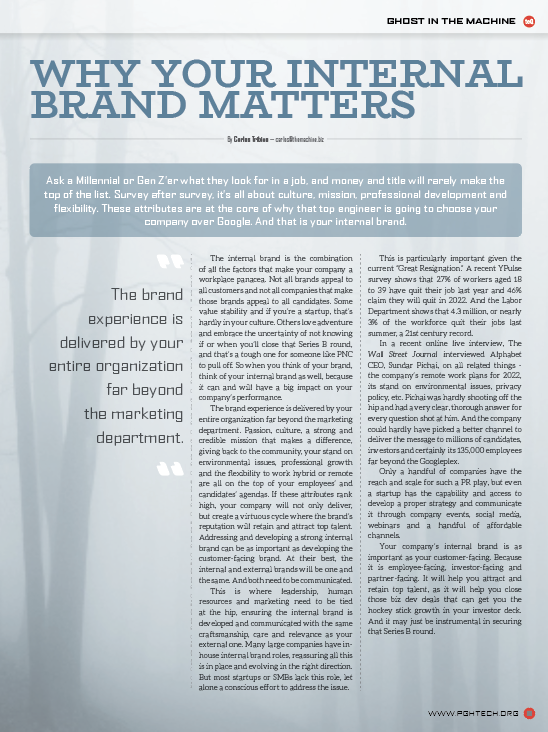Why Internal Brand Matters
By Carlos Tribino, The Machine
 Ask a Millennial or Gen Z’er what they look for in a job, and money and title will rarely make the top of the list. Survey after survey, it’s all about culture, mission, professional development and flexibility. These attributes are at the core of why that top engineer is going to choose your company over Google. And that is your internal brand.
Ask a Millennial or Gen Z’er what they look for in a job, and money and title will rarely make the top of the list. Survey after survey, it’s all about culture, mission, professional development and flexibility. These attributes are at the core of why that top engineer is going to choose your company over Google. And that is your internal brand.
The internal brand is the combination of all the factors that make your company a workplace panacea. Not all brands appeal to all customers and not all companies that make those brands appeal to all candidates. Some value stability and if you’re a startup, that’s hardly in your culture. Others love adventure and embrace the uncertainty of not knowing if or when you’ll close that Series B round, and that’s a tough one for someone like PNC to pull off. So when you think of your brand, think of your internal brand as well, because it can and will have a big impact on your company’s performance.
The brand experience is delivered by your entire organization far beyond the marketing department. Passion, culture, a strong and credible mission that makes a difference, giving back to the community, your stand on environmental issues, professional growth and the flexibility to work hybrid or remote are all on the top of your employees’ and candidates’ agendas. If these attributes rank high, your company will not only deliver, but create a virtuous cycle where the brand’s reputation will retain and attract top talent. Addressing and developing a strong internal brand can be as important as developing the customer-facing brand. At their best, the internal and external brands will be one and the same. And both need to be communicated.
This is where leadership, human resources and marketing need to be tied at the hip, ensuring the internal brand is developed and communicated with the same craftsmanship, care and relevance as your external one. Many large companies have in-house internal brand roles, reassuring all this is in place and evolving in the right direction. But most startups or SMBs lack this role, let alone a conscious effort to address the issue.
This is particularly important given the current “Great Resignation.” A recent YPulse survey shows that 27% of workers aged 18 to 39 have quit their job last year and 46% claim they will quit in 2022. And the Labor Department shows that 4.3 million, or nearly 3% of the workforce quit their jobs last summer, a 21st century record.
The internal brand is the combination of all the factors that make your company a workplace panacea. Not all brands appeal to all customers and not all companies that make those brands appeal to all candidates. Some value stability and if you’re a startup, that’s hardly in your culture.
In a recent online live interview, The Wall Street Journal interviewed Alphabet CEO, Sundar Pichai, on all related things - the company’s remote work plans for 2022, its stand on environmental issues, privacy policy, etc. Pichai was hardly shooting off the hip and had a very clear, thorough answer for every question shot at him. And the company could hardly have picked a better channel to deliver the message to millions of candidates, investors and certainly its 135,000 employees far beyond the Googleplex.
Only a handful of companies have the reach and scale for such a PR play, but even a startup has the capability and access to develop a proper strategy and communicate it through company events, social media, webinars and a handful of affordable channels.
Your company’s internal brand is as important as your customer-facing. Because it is employee-facing, investor-facing and partner-facing. It will help you attract and retain top talent, as it will help you close those biz dev deals that can get you the hockey stick growth in your investor deck. And it may just be instrumental in securing that Series B round.